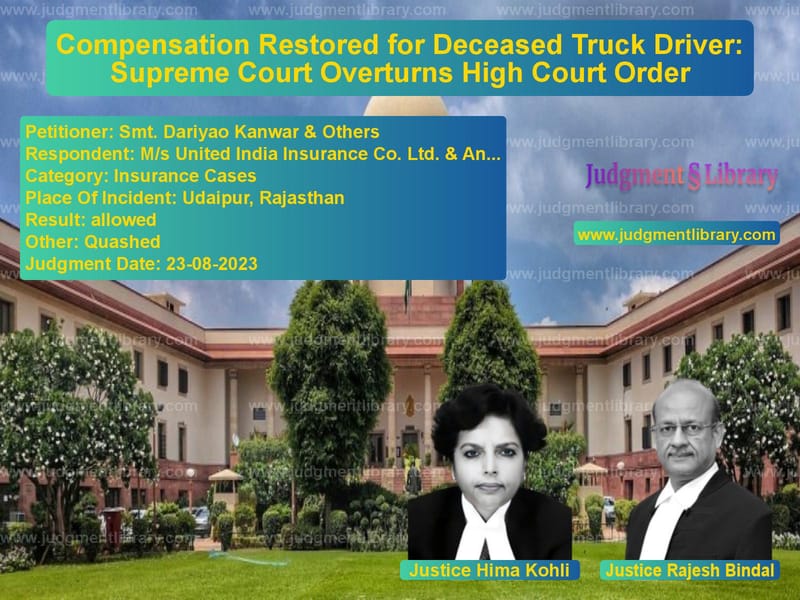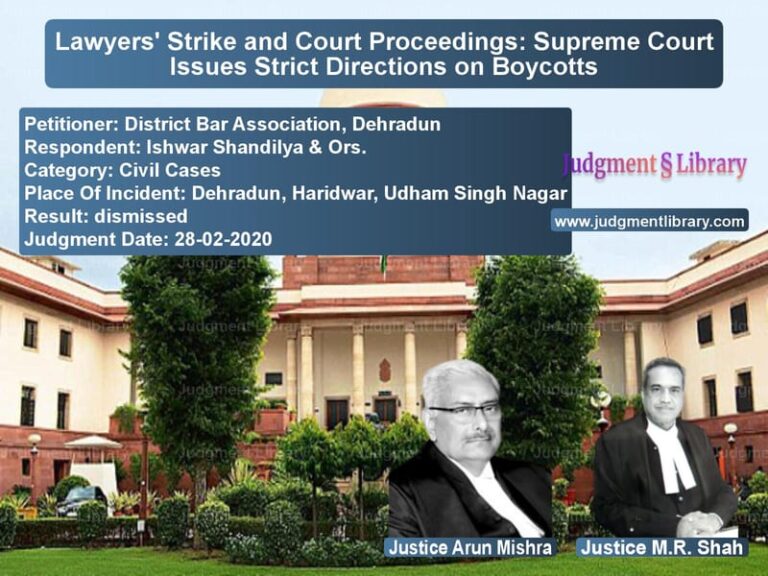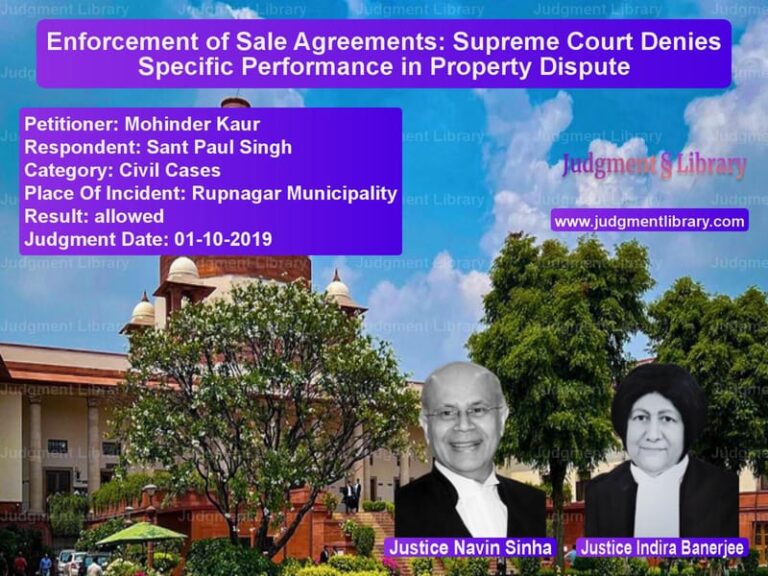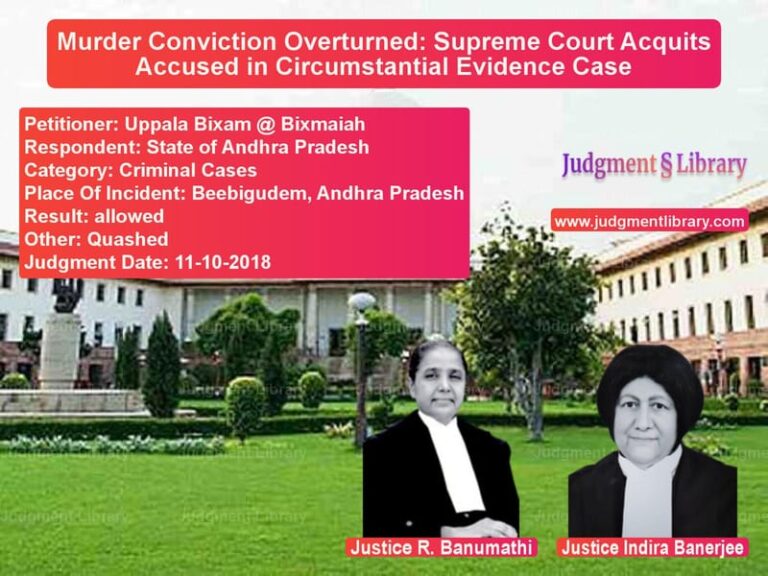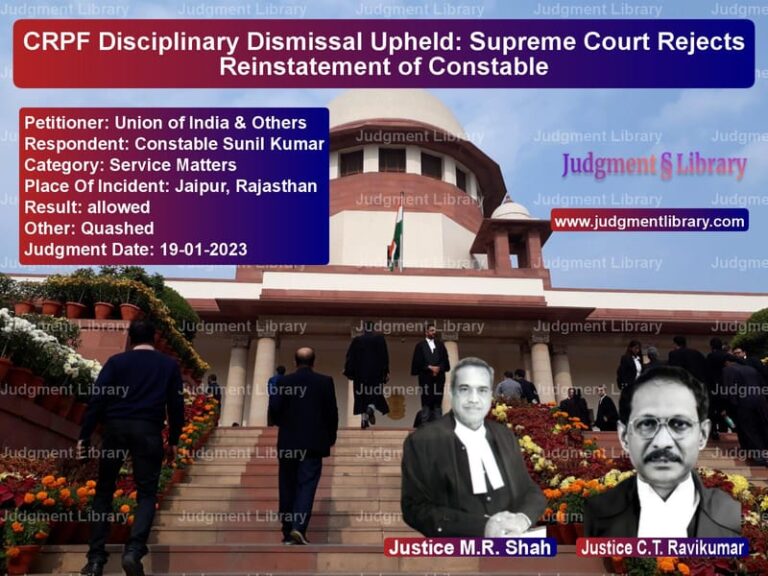Compensation Restored for Deceased Truck Driver: Supreme Court Overturns High Court Order
The Supreme Court of India recently delivered a landmark judgment in the case of Smt. Dariyao Kanwar & Others vs. M/s United India Insurance Co. Ltd. & Another, reinstating compensation for the dependents of a truck driver who passed away while on duty. The Court set aside the High Court’s ruling, affirming that prolonged stress from employment contributed to the driver’s death and that his dependents were entitled to compensation under the Employee’s Compensation Act, 1923.
Background of the Case
The deceased, Sumer Singh, was employed as a truck driver for a commercial vehicle owned by the respondent. On September 15, 2003, while driving from Delhi to Baroda (Gujarat), he felt unwell and stopped his vehicle at Goverdhan Vilas, Udaipur (Rajasthan). He was later found unconscious and declared dead at a hospital. The cause of death was reported to be stress-induced heart failure.
The deceased’s family filed a compensation claim under the Employee’s Compensation Act, 1923. The Workmen’s Compensation Commissioner awarded ₹3,26,140 (Rupees three lakh twenty-six thousand one hundred and forty) with interest at 12% per annum from September 15, 2003, until the date of realization. However, the High Court overturned this decision, ruling that the death was not directly linked to his employment.
Key Legal Issues
- Whether the deceased’s death was a direct consequence of his employment.
- Whether the prolonged stress and strain of driving a commercial vehicle contributed to the medical condition leading to his death.
- The liability of the insurance company under the Employee’s Compensation Act, 1923.
Arguments by the Appellants (Dependents of the Deceased)
The legal representatives of Sumer Singh argued that:
- The deceased was assigned to drive a truck for long hours, which caused immense physical and mental stress.
- The insurance policy purchased by the vehicle owner covered compensation under the Employee’s Compensation Act.
- Medical reports confirmed that the deceased had no history of prior illness, ruling out natural causes.
- Previous Supreme Court judgments have established that work-related stress leading to death can be considered an employment-related accident.
Arguments by the Respondents (Insurance Company)
The insurance company contended:
- There was no direct link between the deceased’s job and his death.
- The death was due to a pre-existing medical condition and not work-related stress.
- The insurance policy was intended for motor accident claims, and the death did not result from a vehicular accident.
- There was no medical evidence proving that work conditions caused or contributed to the death.
Key Observations by the Supreme Court
The Supreme Court examined the evidence and made the following critical observations:
1. Establishing a Link Between Work and Death
“There is every reason to assume that long spells of driving was a material contributory factor, if not the sole cause, that accelerated his unexpected death at a young age.”
The Court noted that prolonged driving can lead to extreme fatigue and stress, which in turn can cause sudden health deterioration.
2. Applicability of the Employee’s Compensation Act
“An untoward mishap during employment can reasonably be described as an accident attributable to the nature of employment.”
The Court reaffirmed that compensation is payable when employment conditions contribute to or aggravate an employee’s medical condition, leading to death.
3. Insurance Coverage Under the Policy
“The insurance policy purchased by the vehicle owner included additional premium coverage for employee compensation under the 1923 Act.”
Since the insurance policy covered liability under the Employee’s Compensation Act, the insurer was held liable for paying the compensation.
Legal Precedents Considered
The Supreme Court relied on previous judgments, including:
- Param Pal Singh v. National Insurance Co. (2013) 3 SCC 409: Held that long-distance truck driving stress can contribute to sudden health failures, making it an employment-related accident.
- Northeast Karnataka Road Transport Corporation v. Sujatha (2019) 11 SCC 514: Confirmed that employment-related health deterioration qualifies for compensation.
- Ved Prakash Garg v. Premi Devi (1997) 8 SCC 1: Clarified the extent of insurer liability under the Employee’s Compensation Act.
Final Judgment
Based on these findings, the Supreme Court ruled:
“The appeal stands allowed. The impugned order of the High Court is set aside. The order of the Workmen’s Compensation Commissioner is restored.”
The Court reinstated the compensation amount of ₹3,26,140 with 12% interest per annum from September 15, 2003, to the date of realization.
Conclusion
The judgment in Smt. Dariyao Kanwar & Others vs. M/s United India Insurance Co. Ltd. serves as an essential precedent affirming the rights of employees and their dependents under the Employee’s Compensation Act, 1923. The ruling clarifies that work-related stress and strain can qualify as an accident for compensation purposes. It also reinforces the insurer’s liability when an insurance policy explicitly covers compensation under the Act. This verdict is a significant victory for workers in physically demanding jobs, ensuring that their families are not left without support due to employment-related fatalities.
Petitioner Name: Smt. Dariyao Kanwar & Others.Respondent Name: M/s United India Insurance Co. Ltd. & Another.Judgment By: Justice Hima Kohli, Justice Rajesh Bindal.Place Of Incident: Udaipur, Rajasthan.Judgment Date: 23-08-2023.
Don’t miss out on the full details! Download the complete judgment in PDF format below and gain valuable insights instantly!
Download Judgment: smt.-dariyao-kanwar-vs-ms-united-india-ins-supreme-court-of-india-judgment-dated-23-08-2023.pdf
Directly Download Judgment: Directly download this Judgment
See all petitions in Compensation Disputes
See all petitions in Motor Insurance Settlements
See all petitions in Judgment by Hima Kohli
See all petitions in Judgment by Rajesh Bindal
See all petitions in allowed
See all petitions in Quashed
See all petitions in supreme court of India judgments August 2023
See all petitions in 2023 judgments
See all posts in Insurance Cases Category
See all allowed petitions in Insurance Cases Category
See all Dismissed petitions in Insurance Cases Category
See all partially allowed petitions in Insurance Cases Category

